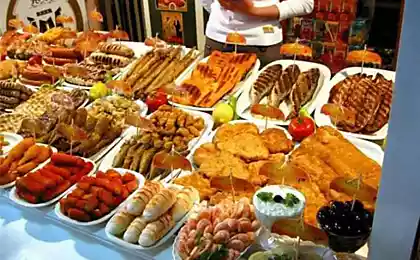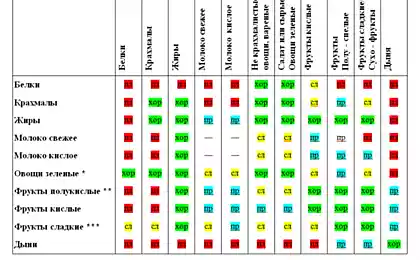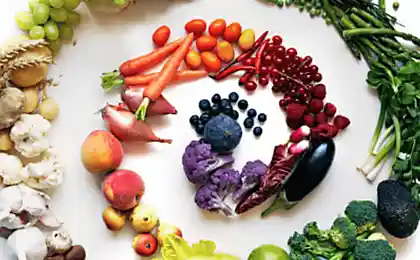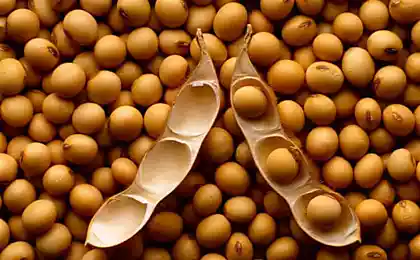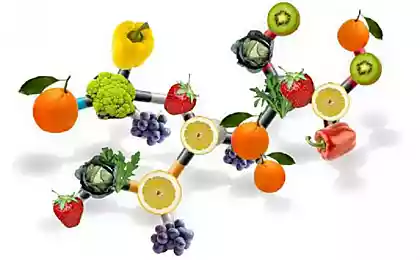179
List of exotic and not-so foods banned in the US
We offer you an incomplete list of exotic and not very food products that for various reasons have been banned in the United States:
Fugu fish
Cooking and selling this fish without a license is illegal in the United States. In the European Union, fugu trade is also strictly prohibited. And all because the scales and internal organs of fugu are very poisonous and contain tetrodotoxin - a poison of neuroparalytic action that causes asphyxia. In Japan, the ban on fugu has long been abolished - dishes from this fish are considered a delicacy and are sold in local restaurants.
Akiki
Due to its toxicity, this pear-shaped fruit called aki is prohibited from growing and importing into the United States. Aki is considered the national fruit of Jamaica and contains the poison hypoglycine, which can lead to poisoning, coma and even death.
absinthe
Absinthe was banned in the United States in the early 20th century, and in 1997, the drink was allowed to be imported into the country under the strict supervision of the Food Safety Administration. And the reason for this is the grass wormwood, from which absinthe is obtained. It contains the substance thujone, which is considered a strong hallucinogen and addictive.
Unpasteurized milk
More than 20 states have banned the sale of raw milk. Some states allow the sale of raw milk supplied from private farms in small quantities. Unpasteurized milk was an everyday food item until the early 19th century, when pasteurization technologies were introduced to make milk safer. Laws banning raw milk are aimed at protecting consumers from harmful germs and bacteria. However, proponents of unpasteurized milk argue that the sanitary standards used in agriculture make it possible to produce milk that is absolutely safe for health.
Pork blood cake
It is a Taiwanese delicacy consisting of rice and pig blood on a stick. Although the American hot dog is hardly a healthier food than this dish, pork blood cake is banned in the United States because it is considered unsanitary.
Foie gras
A delicacy made from the liver of a duck or goose was banned in Chicago from 2006 to 2008 because City Council members deemed the forced feeding of animals inhumane. 8 days before slaughter, a huge amount of mashed corn is introduced into the goose, because of which the liver increases 10 times. In 2012, forced fattening of animals was banned in California.
haggis
Haggis was banned in America because one of its ingredients is light rams. Heart, liver and lamb stomach, also included in the dish, the US authorities considered fit for food.
Kosu martsu
It is a traditional Sardinian cheese made from another cheese, pecorino. It is kept longer than the usual stage of fermentation, bringing to a state of decay caused by the digestive activity of the cheese fly larvae. Larvae accelerate the breakdown of fats, which makes the cheese soft. Those wishing to taste the marza braid are recommended to protect their eyes during meals, since the larvae are able to jump up to 15 centimeters. Some prefer to remove the larvae before eating, while others eat cheese with them.
garden oatmeal
In Europe, this bird is protected by law. Smuggling oatmeal into the United States is a crime. In France, gourmets have long appreciated the excellent taste of this bird, because of which the number of oatmeal has sharply decreased, and their shooting has become illegal. Birds, as a rule, were caught, poked out their eyes, then placed in a cage, where, like ducks for foie gras, were force-fed to huge sizes. Then the bird was drowned in cognac, fried and eaten entirely.
Sea bass
The sale of perch for profit is prohibited in all states except Mississippi. The U.S. Department of Commerce banned perch fishing in 1986 to increase its population, which has declined dramatically due to the craze for fish.
Sharks fins
Fishing shark fins is prohibited in the States, because a mutilated animal thrown back into the ocean can not move and hunt effectively, so it dies suddenly. Shark fin dishes are considered a luxury and can be consumed legally.
Konina
In most states, it is theoretically possible to taste horse meat, but it is forbidden to kill horses for food. At the same time, some slaughterhouses in America export horse meat to other countries. In June 2010, the U.S. Congress voted to extend the Wild Nomadic Horse and Donkey Protection Act, which prohibits the slaughter of these animals.
source
Source: /users/147
Fugu fish
Cooking and selling this fish without a license is illegal in the United States. In the European Union, fugu trade is also strictly prohibited. And all because the scales and internal organs of fugu are very poisonous and contain tetrodotoxin - a poison of neuroparalytic action that causes asphyxia. In Japan, the ban on fugu has long been abolished - dishes from this fish are considered a delicacy and are sold in local restaurants.
Akiki
Due to its toxicity, this pear-shaped fruit called aki is prohibited from growing and importing into the United States. Aki is considered the national fruit of Jamaica and contains the poison hypoglycine, which can lead to poisoning, coma and even death.
absinthe
Absinthe was banned in the United States in the early 20th century, and in 1997, the drink was allowed to be imported into the country under the strict supervision of the Food Safety Administration. And the reason for this is the grass wormwood, from which absinthe is obtained. It contains the substance thujone, which is considered a strong hallucinogen and addictive.
Unpasteurized milk
More than 20 states have banned the sale of raw milk. Some states allow the sale of raw milk supplied from private farms in small quantities. Unpasteurized milk was an everyday food item until the early 19th century, when pasteurization technologies were introduced to make milk safer. Laws banning raw milk are aimed at protecting consumers from harmful germs and bacteria. However, proponents of unpasteurized milk argue that the sanitary standards used in agriculture make it possible to produce milk that is absolutely safe for health.
Pork blood cake
It is a Taiwanese delicacy consisting of rice and pig blood on a stick. Although the American hot dog is hardly a healthier food than this dish, pork blood cake is banned in the United States because it is considered unsanitary.
Foie gras
A delicacy made from the liver of a duck or goose was banned in Chicago from 2006 to 2008 because City Council members deemed the forced feeding of animals inhumane. 8 days before slaughter, a huge amount of mashed corn is introduced into the goose, because of which the liver increases 10 times. In 2012, forced fattening of animals was banned in California.
haggis
Haggis was banned in America because one of its ingredients is light rams. Heart, liver and lamb stomach, also included in the dish, the US authorities considered fit for food.
Kosu martsu
It is a traditional Sardinian cheese made from another cheese, pecorino. It is kept longer than the usual stage of fermentation, bringing to a state of decay caused by the digestive activity of the cheese fly larvae. Larvae accelerate the breakdown of fats, which makes the cheese soft. Those wishing to taste the marza braid are recommended to protect their eyes during meals, since the larvae are able to jump up to 15 centimeters. Some prefer to remove the larvae before eating, while others eat cheese with them.
garden oatmeal
In Europe, this bird is protected by law. Smuggling oatmeal into the United States is a crime. In France, gourmets have long appreciated the excellent taste of this bird, because of which the number of oatmeal has sharply decreased, and their shooting has become illegal. Birds, as a rule, were caught, poked out their eyes, then placed in a cage, where, like ducks for foie gras, were force-fed to huge sizes. Then the bird was drowned in cognac, fried and eaten entirely.
Sea bass
The sale of perch for profit is prohibited in all states except Mississippi. The U.S. Department of Commerce banned perch fishing in 1986 to increase its population, which has declined dramatically due to the craze for fish.
Sharks fins
Fishing shark fins is prohibited in the States, because a mutilated animal thrown back into the ocean can not move and hunt effectively, so it dies suddenly. Shark fin dishes are considered a luxury and can be consumed legally.
Konina
In most states, it is theoretically possible to taste horse meat, but it is forbidden to kill horses for food. At the same time, some slaughterhouses in America export horse meat to other countries. In June 2010, the U.S. Congress voted to extend the Wild Nomadic Horse and Donkey Protection Act, which prohibits the slaughter of these animals.
source
Source: /users/147
